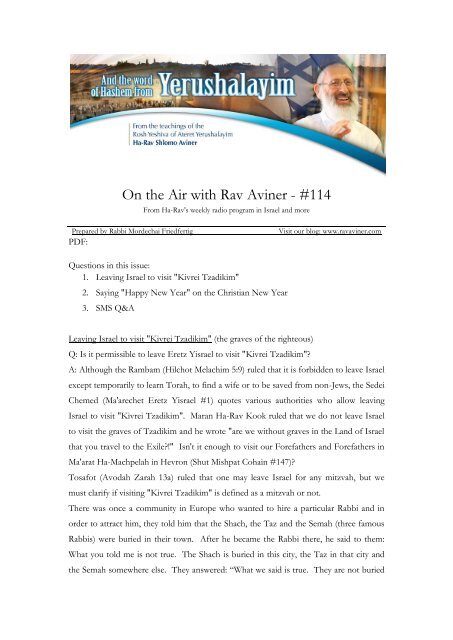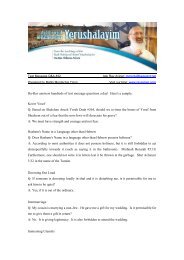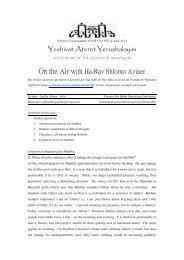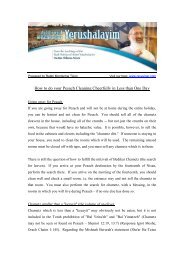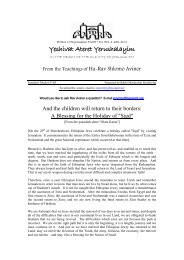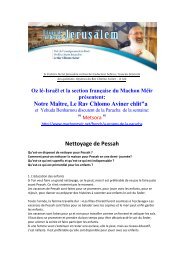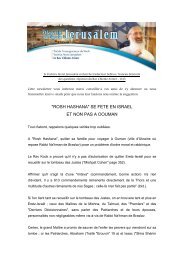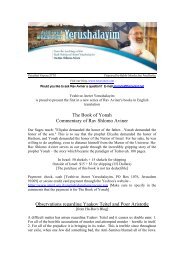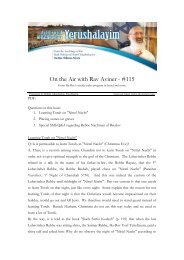On the Air with Rav Aviner - #114
On the Air with Rav Aviner - #114
On the Air with Rav Aviner - #114
Create successful ePaper yourself
Turn your PDF publications into a flip-book with our unique Google optimized e-Paper software.
<strong>On</strong> <strong>the</strong> <strong>Air</strong> <strong>with</strong> <strong>Rav</strong> <strong>Aviner</strong> - <strong>#114</strong><br />
From Ha-<strong>Rav</strong>'s weekly radio program in Israel and more<br />
Prepared by Rabbi Mordechai Friedfertig<br />
PDF:<br />
Visit our blog: www.ravaviner.com<br />
Questions in this issue:<br />
1. Leaving Israel to visit "Kivrei Tzadikim"<br />
2. Saying "Happy New Year" on <strong>the</strong> Christian New Year<br />
3. SMS Q&A<br />
Leaving Israel to visit "Kivrei Tzadikim" (<strong>the</strong> graves of <strong>the</strong> righteous)<br />
Q: Is it permissible to leave Eretz Yisrael to visit "Kivrei Tzadikim"<br />
A: Although <strong>the</strong> Rambam (Hilchot Melachim 5:9) ruled that it is forbidden to leave Israel<br />
except temporarily to learn Torah, to find a wife or to be saved from non-Jews, <strong>the</strong> Sedei<br />
Chemed (Ma'arechet Eretz Yisrael #1) quotes various authorities who allow leaving<br />
Israel to visit "Kivrei Tzadikim". Maran Ha-<strong>Rav</strong> Kook ruled that we do not leave Israel<br />
to visit <strong>the</strong> graves of Tzadikim and he wrote "are we <strong>with</strong>out graves in <strong>the</strong> Land of Israel<br />
that you travel to <strong>the</strong> Exile!" Isn't it enough to visit our Forefa<strong>the</strong>rs and Forefa<strong>the</strong>rs in<br />
Ma'arat Ha-Machpelah in Hevron (Shut Mishpat Cohain #147)<br />
Tosafot (Avodah Zarah 13a) ruled that one may leave Israel for any mitzvah, but we<br />
must clarify if visiting "Kivrei Tzadikim" is defined as a mitzvah or not.<br />
There was once a community in Europe who wanted to hire a particular Rabbi and in<br />
order to attract him, <strong>the</strong>y told him that <strong>the</strong> Shach, <strong>the</strong> Taz and <strong>the</strong> Semah (three famous<br />
Rabbis) were buried in <strong>the</strong>ir town. After he became <strong>the</strong> Rabbi <strong>the</strong>re, he said to <strong>the</strong>m:<br />
What you told me is not true. The Shach is buried in this city, <strong>the</strong> Taz in that city and<br />
<strong>the</strong> Semah somewhere else. They answered: “What we said is true. They are not buried
<strong>the</strong>re, because <strong>the</strong> people <strong>the</strong>re learn <strong>the</strong>ir words, and <strong>the</strong>se Torah scholars are <strong>the</strong>refore<br />
still alive. But in our city – to our great distress – we do not learn <strong>the</strong>ir words. As a<br />
result, <strong>the</strong>y are buried here and we <strong>the</strong>refore need you as our Rabbi.” We learn from<br />
here that it is more important to learn <strong>the</strong> words of Torah scholars than visit <strong>the</strong>ir graves.<br />
Visiting "Kivrei Tzadikim" does have value, as we know Calev ben Yefuneh left <strong>the</strong> spies<br />
to daven at Ma'arat Ha-Machpelah (Sotah 34b and Rashi on Bamidbar 13:22), but<br />
learning <strong>the</strong> Torah scholars works which spiritually elevate a person is certainly more<br />
important.<br />
Fur<strong>the</strong>rmore, if a person lives close to <strong>the</strong> cemetery that is one thing but to fly great<br />
distances costs thousands of Shekels. Giving Tzedakah is a much clearer mitzvah than<br />
visiting "Kivrei Tzadikim." If one is looking for "segulot" (spiritual remedies), <strong>the</strong><br />
greatest "segulah" is giving tzedakah. "Tzedakah saves one from death" (Mishlei 10:2,<br />
11:4). This is true not only for <strong>the</strong> one who receives but also for <strong>the</strong> one who gives. The<br />
Gemara in Shabbat (156b) says that astrologers told Rabbi Akiva that <strong>the</strong> day his<br />
daughter gets married, she will be bitten by a snake and die. He was obviously very<br />
worried. <strong>On</strong> <strong>the</strong> day of her Chupah, she took a decorative pin out of her hair and<br />
inserted it in to <strong>the</strong> wall, and it struck a snake in its eye. In <strong>the</strong> morning, she when she<br />
removed it, <strong>the</strong> dead snake came out after it. Rabbi Akiva asked her: what good thing did<br />
you do She said: <strong>On</strong> <strong>the</strong> day of <strong>the</strong> wedding, a poor person came to <strong>the</strong> door and<br />
because everyone else was busy <strong>with</strong> <strong>the</strong> meal, no one heard him. I took <strong>the</strong> portion you<br />
gave me, and gave it to him. Rabbi Akiva said: "Tzedakah saves one from death."<br />
Therefore, instead of traveling great distances to visit "Kivrei Tzadikim," one should use<br />
<strong>the</strong> money to help <strong>the</strong> poor.<br />
Ha-<strong>Rav</strong> Shlomo Zalman Auerbach would travel from his house to Yeshivat Kol Torah in<br />
<strong>the</strong> Jerusalem neighborhood of Bayit Ve-Gan, and he would pass <strong>the</strong> national cemetery<br />
on Mt. Herzl. He would pray <strong>the</strong>re, saying: "These are <strong>the</strong> graves of <strong>the</strong> righteous who<br />
died sanctifying Hashem's Name. Why should I travel far distances"<br />
Visiting "Kivrei Tzadikim" certainly has value but one must always weigh it against o<strong>the</strong>r<br />
considerations.<br />
Saying "Happy New Year" on <strong>the</strong> Christian New Year<br />
Q: Is it permissible to say "Happy New Year" on <strong>the</strong> Christian New Year<br />
A: No, because <strong>the</strong> Christian year is connected to idol worship. It is forbidden to give<br />
respect to idol worship in any form. A person who says "Happy New Year" is not
worshipping idols but he is acknowledging it in a positive way. It is similar to <strong>the</strong><br />
Halachah that it is forbidden for a person to say to his friend: "Let's meet by this<br />
church," since he is acknowledging idol worship. <strong>On</strong>e should <strong>the</strong>refore say: "Good<br />
morning," "Good day" or something else.<br />
Text Message Responsa<br />
Ha-<strong>Rav</strong> answers hundreds of text message questions a week. Some appear in <strong>the</strong><br />
parashah sheets "Ma'ayanei Ha-Yeshu'ah," "Olam Ha-Katan" and "Be-Ahavah U-Be-<br />
Emunah." Here's a sample:<br />
Q: Should I go to a health clinic which cures based on <strong>the</strong> Rambam<br />
A: The Rambam completely opposes such conduct in his letters relating to medicine.<br />
You should go to regular doctors.<br />
Q: If my young boy cries should I give him what he wants or let him cry<br />
A: First check if he is sick or hurt. If he is not, but crying because you will not give into<br />
his demands, talk to him and try to calm him. If this does not work, do not give in<br />
because he will grow up to be spoiled and it will be detrimental to his personality.<br />
Q: Should I wear Tzitzit at night<br />
A: Certainly.<br />
Q: Is it permissible for a pregnant woman to visit "Kivrei Tzadikkim" (The graves of <strong>the</strong><br />
righteous)<br />
A: Yes, <strong>the</strong>re is no problem.<br />
Q: Is <strong>the</strong>re a problem calling <strong>the</strong> months by <strong>the</strong> non-Jewish names which <strong>the</strong> Jews<br />
learned in Babylonian Exile<br />
A: It is a remembrance of <strong>the</strong> Second Redemption. Ramban on Shemot 12:2.<br />
Q: How many times a day must a woman daven<br />
A: Some say Shachrit and Minchah. Some say <strong>the</strong> Morning Blessings. And <strong>the</strong>re are<br />
many positions in between.<br />
Q: Is it permissible to given meat and dairy which was cooked toge<strong>the</strong>r to an animal<br />
A: No, it is forbidden to have any benefit from it.<br />
Q: Is it permissible for me to volunteer for reserve duty against my wife’s will<br />
A: Come to a mutual agreement.<br />
Special thank you to Fred Casden for editing "<strong>On</strong> <strong>the</strong> <strong>Air</strong>"


